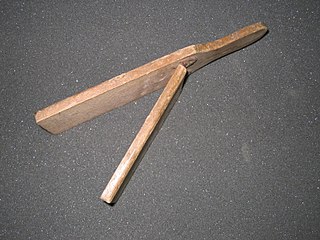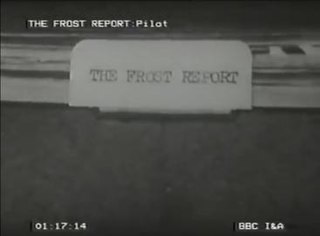| Clarence | |
|---|---|
 | |
| Genre | Sitcom |
| Created by | Ronnie Barker |
| Written by | Bob Ferris |
| Starring | Ronnie Barker Josephine Tewson |
| Country of origin | United Kingdom |
| No. of episodes | 6 |
| Production | |
| Running time | 30 minutes per episode |
| Distributor | BBC Studios 2entertain ABC (Australia, home video) |
| Release | |
| Original network | BBC2 |
| Original release | 4 January – 8 February 1988 |
Clarence is a 1988 BBC situation comedy starring Ronnie Barker and Josephine Tewson, written by Ronnie Barker under the pseudonym "Bob Ferris" as an acknowledgement to Dick Clement and Ian La Frenais, creators of Porridge . It was Barker's final sitcom appearance before his retirement.
The British Broadcasting Corporation (BBC) is a British public service broadcaster. Its headquarters are at Broadcasting House in Westminster, London, and it is the world's oldest national broadcasting organisation and the largest broadcaster in the world by number of employees. It employs over 20,950 staff in total, 16,672 of whom are in public sector broadcasting. The total number of staff is 35,402 when part-time, flexible, and fixed-contract staff are included.
A sitcom, clipping for situational comedy, is a genre of comedy centered on a fixed set of characters who carry over from episode to episode. Sitcoms can be contrasted with sketch comedy, where a troupe may use new characters in each sketch, and stand-up comedy, where a comedian tells jokes and stories to an audience. Sitcoms originated in radio, but today are found mostly on television as one of its dominant narrative forms. This form can also include mockumentaries.

Ronald William George Barker, was an English actor, comedian and writer. He was known for roles in British comedy television series such as Porridge, The Two Ronnies, and Open All Hours.
Contents
Barker had previously faced some criticism over his employment of a stammer for comedic effect in Open All Hours . However, the slapstick potential of a short-sighted furniture shifter must have seemed irresistible. The series was inspired by "The Removals Person" by Hugh Leonard, [1] an episode in the 1971 LWT comedy anthology series, Six Dates With Barker . The pilot episode has the same plot and a very similar script, even to the extent of Tewson reprising her earlier role. The only significant difference is that in "The Removals Person" Barker's character is named Fred.
Stuttering, also known as stammering, is a speech disorder in which the flow of speech is disrupted by involuntary repetitions and prolongations of sounds, syllables, words or phrases as well as involuntary silent pauses or blocks in which the person who stutters is unable to produce sounds. The term stuttering is most commonly associated with involuntary sound repetition, but it also encompasses the abnormal hesitation or pausing before speech, referred to by people who stutter as blocks, and the prolongation of certain sounds, usually vowels or semivowels. According to Watkins et al., stuttering is a disorder of "selection, initiation, and execution of motor sequences necessary for fluent speech production". For many people who stutter, repetition is the primary problem. The term "stuttering" covers a wide range of severity, encompassing barely perceptible impediments that are largely cosmetic to severe symptoms that effectively prevent oral communication. In the world, approximately four times as many men as women stutter, encompassing 70 million people worldwide, or about 1% of the world's population.

Open All Hours is a British television sitcom created and written by Roy Clarke for the BBC. It ran for 26 episodes in four series, which premiered in 1976, 1981, 1982 and 1985. The programme developed from a television pilot broadcast in Ronnie Barker's comedy anthology series, Seven of One (1973). Open All Hours ranked eighth in the 2004 Britain's Best Sitcom poll. A sequel, entitled Still Open All Hours, was created in 2013.

Slapstick is a style of humor involving exaggerated physical activity which exceeds the boundaries of normal physical comedy. The term arises from a device developed during the broad, physical comedy style known as Commedia dell'arte in 16th Century Italy. The "slap stick" consists of two thin slats of wood, which make a 'slap' when striking another actor, with little force needed to make a loud—and comical—sound. The physical slap stick remains a key component of the plot in the traditional and popular Punch and Judy puppet show.
Only one series of Clarence was made, which is now available on DVD. The series is also available in Region 4 Australia with the same cover art. The house of Jane Travers, which inspired the opening titles, is located on Malvern Road in Cheltenham [2]

DVD is a digital optical disc storage format invented and developed in 1995. The medium can store any kind of digital data and is widely used for software and other computer files as well as video programs watched using DVD players. DVDs offer higher storage capacity than compact discs while having the same dimensions.









